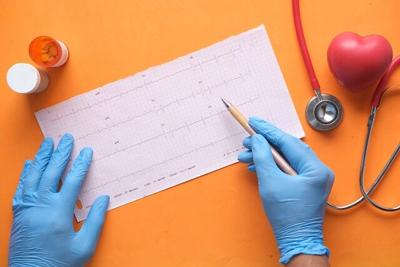
An electroencephalogram (EEG) and an electrocardiogram (ECG) are two powerful diagnostic tools that provide valuable information about the electrical activity of the brain and the heart, respectively. While EEG measures the brain's electrical activity, ECG measures the heart's electrical activity. Here are some key points that you should know about ECG-EEG Tests.
Facts About ECG-EEG
The EEG test involves attaching electrodes to the scalp to record the brain's electrical activity. It can diagnose neurological conditions such as epilepsy, sleep disorders and brain tumors. The test is painless, non-invasive and typically takes 30-60 minutes to complete.
An ECG measures the heart's electrical activity by recording the electrical signals that travel through the heart as it beats. It is commonly used to diagnose heart conditions such as arrhythmia, heart attack, and heart failure. ECG is also non-invasive and painless; the test takes only a few minutes to complete.
Combining EEG and ECG tests can provide valuable information for the diagnosis of neurological conditions. For example, some abnormalities in the heart's electrical activity are associated with certain neurological conditions such as epilepsy and stroke. Doctors can identify these abnormalities by recording EEG and ECG signals and making a more accurate diagnosis.
Moreover, EEG and ECG can also be used to monitor the brain and heart activity during surgeries or medical treatments that can affect them, such as anesthesia. In these cases, EEG and ECG monitoring can help doctors ensure the patient's safety and adjust the treatment accordingly.
The Importance of ECG-EEG Tests
The power of the signals provided by EEG and ECG tests is undeniable in the field of neurological diagnosis. By combining these tests and analyzing the results, doctors can gain a better understanding of the underlying neurological conditions and provide more effective treatment options for patients. Here are some reasons why EC and EEG tests are important for neurological diagnosis:
Accurate Diagnosis
Seer Medical's ECG-EEG test can provide valuable information about the electrical activity of the heart and the brain, respectively. By analyzing the signals recorded by these tests, doctors can diagnose various neurological conditions with greater accuracy.
Early Detection
ECG-EEG tests can detect neurological conditions at an early stage, allowing doctors to provide timely treatment and prevent further damage to the brain or heart.
Non-invasive and Painless
Both ECG and EEG tests are non-invasive and painless, making them safe and convenient diagnostic tools.
Monitoring Treatment
ECG-EEG tests can also be used to monitor the effectiveness of treatments for neurological conditions. By tracking changes in electrical activity over time, doctors can evaluate the response to treatment and adjust it accordingly.
Surgical Safety
EEG and ECG monitoring during surgeries or medical treatments that can affect the brain or heart can help doctors ensure the patient's safety and adjust the treatment accordingly.
Research Development
ECG-EEG tests are also important for research in the field of neuroscience. They may provide valuable data for understanding brain and heart functions and can be used to develop new treatments for neurological conditions.
Diagnosis and Treatment of Neurological Conditions
ECG-EEG tests play a crucial role in the diagnosis and treatment of neurological conditions. They are non-invasive, painless, and provide valuable information that can help doctors make accurate diagnoses and provide effective treatment options for patients.
ECG-EEG and Your Health
ECG-EEG tests provide powerful diagnostic tools for the evaluation of neurological conditions. By recording and analyzing the electrical activity of the brain and heart, these tests can provide valuable information for accurate diagnosis and effective treatment.
They are non-invasive, painless, and provide real-time monitoring during surgeries or medical treatments. Additionally, ECG-EEG tests offer a wealth of information for research in the field of neuroscience, which can lead to discoveries and treatments for neurological conditions.
ECG-EEG tests play a crucial role in diagnosing and treating neurological conditions. They are non-invasive, painless, and provide valuable information that can help doctors make accurate diagnoses and effective treatment options for patients.
Here are Some Other Articles Related to Your Search:
Tips for finding the right primary care provider
Keeping Track of Your Meds: A Guide to Effective Medication Management


(0) comments
We welcome your comments
Log In
Post a comment as Guest
Keep it Clean. Please avoid obscene, vulgar, lewd, racist or sexually-oriented language.
PLEASE TURN OFF YOUR CAPS LOCK.
Don't Threaten. Threats of harming another person will not be tolerated.
Be Truthful. Don't knowingly lie about anyone or anything.
Be Nice. No racism, sexism or any sort of -ism that is degrading to another person.
Be Proactive. Use the 'Report' link on each comment to let us know of abusive posts.
Share with Us. We'd love to hear eyewitness accounts, the history behind an article.